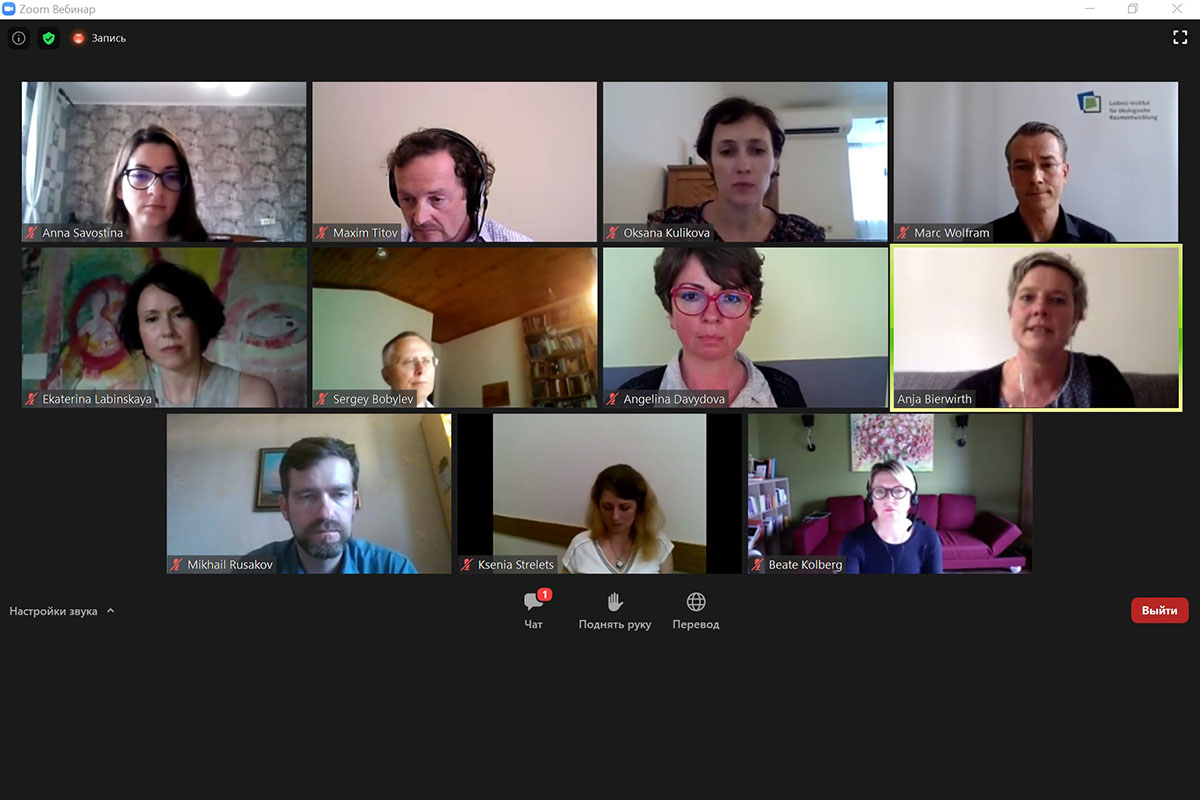
МГУПП принял участие в третьем вебинаре «Город после пандемии» // MSUFP participated in the third webinar "The City After the Pandemic"
9 июля 2020Заключительный вебинар из серии онлайн-дебатов
«Город после пандемии: станет ли город будущего экологичнее?» прошёл 7 июля. Его организовали Германский дом науки и инноваций (DWIH) в Москве и Информационный центр Германской службы академических обменов (DAAD) в Санкт-Петербурге в сотрудничестве с Северо-Западным филиалом Российско-Германской внешнеторговой палаты (AHK) в Санкт-Петербурге.
Спикерами третьего вебинара выступили:
- Директор Института экологического и территориального развития Объединения им. Лейбница, преподаватель кафедры территориального развития Дрезденского технического университета, издатель журнала открытого доступа «Urban Transformations», профессор, д-р Марк Вольфрам
- Руководитель исследовательского направления «Городская трансформация» Вуппертальского университета, отделение энергетической, транспортной и экологической политики Аня Бирвирт
- Заведующий кафедрой, доктор экономических наук, профессор, заслуженный деятель науки РФ, руководитель Центра биоэкономики и эко-инноваций ЭФ МГУ Сергей Бобылев
- Дизайнер Екатерина Лабинская
- Исполнительный директор Исследовательского центра энергетической политики (ИЦ ЭНЕРПО) Европейского университета в Санкт-Петербурге Максим Титов
- Доцент Инженерно-строительного института Санкт-Петербургского политехнического университета Петра Великого Ксения Стрелец
Модератором вебинара стала экологический журналист Ангелина Давыдова.
Российские и немецкие учёные и эксперты обсудили вопросы создания и поддержания более «зелёных», низкоуглеродных и жизнестойких мегаполисов, механизмы городского управления для устойчивой работы урбанизированных территорий. Главным предметом дискуссии стала экология будущего города.
В ходе дискуссии затрагивались такие темы, как:
- новый взгляд на развитие концепции города с точки зрения ценности человеческой жизни;
- необходимость отстоять существование и развитие «наилучших доступных технологий»;
- различная степень глубины влияния пандемии на города в зависимости от физической и экономической структуры города;
- необходимость развития «15-минутных» населённых пунктов, расположенных в непосредственной близости от мегаполисов, с учётом возросшего перемещения людей из больших городов;
- переход городского устройства от понятия resilient (способность к быстрому восстановлению городов) к sustainable (устойчивое развитие);
- перемещение бизнеса из центра городов в окраины;
- развитие городов с учётом создания условий для профилактики и предотвращения болезней;
- поддержание устойчивого экологического развития не только с учётом экономических аспектов;
- увеличение реализации таких положительных примеров, как «зелёные сделки».
Более экологичным наши города помогают сделать принципы совместного использования (sharing economy), популярные среди молодых людей.
Для продвижения новых «зелёных технологий» необходимо, чтобы они стали модными и привлекательными вначале среди наиболее обеспеченных слоёв населения.
Изоляция граждан показала, как быстро природа может «отдохнуть» и восстановиться, но исследования учёных, к сожалению, говорят, что процессы формирования климата земли намного сложнее и эффект, возникший за несколько месяцев пандемии, не окажет большого влияния на глобальную ситуацию.
Примечательно, что Центральным банком РФ впервые был выпущен доклад о влиянии изменении климата на финансовую сферу.
По итогу всего сказанного был сделан вывод, что охранять природу выгодно.
Напомним, что запись всех трёх вебинаров будет доступна на сайте Германского дома науки и инноваций (DWIH) в Москве https://www.dwih-moskau.org/ru/.
The final webinar in the series of online debates "The city after the pandemic: will the city of the future become greener?" was held on July 7. It was organized by the German House of Science and Innovation (DWIH) in Moscow and the Information Center of the German Academic Exchange Service (DAAD) in St. Petersburg in cooperation with the Northwest Branch of the Russian-German Chamber of Commerce (AHK) in St. Petersburg.
The speakers of the third webinar were:
- Director of the Institute for Environmental and Spatial Development of the Leibniz Association. Leibniz Institute for Environmental and Spatial Development, lecturer at the Department of Spatial Development at Dresden University of Technology, publisher of the open access journal Urban Transformations, Prof. Dr. Marc Wolfram
- Head of the Urban Transformations research group at the University of Wuppertal, Department of Energy, Transport and Environmental Policy Anja Bierwirth
- Head of the Department, Doctor of Economics, Professor, Honored Scientist of the Russian Federation, Head of the Center for Bioeconomics and Ecoinnovations of the Faculty of Economics of Moscow State University Sergey Bobylev
- Designer Ekaterina Labinskaya
- Maxim Titov, Executive Director of Energy Policy Research Center, European University in St. Petersburg
- Ksenia Strelets, Associate Professor of the Civil Engineering Institute of Peter the Great St. Petersburg Polytechnic University
Environmental journalist Angelina Davydova moderated the webinar.
Russian and German scientists and experts discussed the creation and maintenance of greener, low-carbon and resilient megacities, urban management mechanisms for sustainable urbanized territories. The main subject of the discussion was the ecology of the future city.
The discussion touched on such topics as:
- A new perspective on the development of the concept of the city in terms of the value of human life;
- The need to defend the existence and development of the "best available technology";
- varying degrees of pandemic impact on cities depending on the physical and economic structure of the city;
- the need to develop "15-minute" settlements located in close proximity to megacities, taking into account the increased movement of people from large cities; - the transition of the urban structure from resilient (the ability to rebuild cities quickly) to sustainable (sustainable development);
- relocation of business from the center of cities to the outskirts;
- the development of cities, taking into account the creation of conditions for the prevention and avoidance of disease;
- supporting sustainable environmental development not only with economic aspects in mind;
- Increasing the implementation of positive examples such as "green deals.
Sharing economy principles, popular among young people, help make our cities more environmentally friendly.
In order to promote new "green technologies" it is necessary that they become fashionable and attractive first among the most affluent segments of the population.
The isolation of citizens has shown how quickly nature can "rest" and recover, but research by scientists, unfortunately, says that the earth's climate formation processes are much more complex and the effect of a few months of a pandemic will not have much impact on the global situation.
It is noteworthy that the Central Bank of the Russian Federation for the first time issued a report on the impact of climate change on the financial sector.
At the end of all this it was concluded that it is profitable to protect the nature.
Recall that a recording of all three webinars will be available on the website of the German House of Science and Innovation (DWIH) in Moscow https://www.dwih-moskau.org/ru/.
